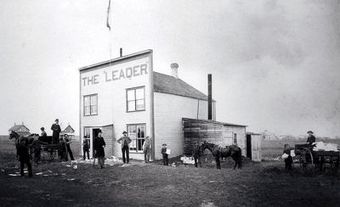The Fifth Estate is Canada’s leading investigative journalism program. Modelled after CBS’s 60 Minutes, it debuted on the CBC in September 1975. It continues to be a flagship series for the public broadcaster. Hosts have included Adrienne Clarkson, Linden MacIntyre, Anna Maria Tremonti, Hana Gartner, Gillian Findlay and Bob McKeown. The show has won 52 Gemini Awards, more than 15 Canadian Screen Awards, two Michener Awards, two International Emmy Awards, a Peabody Award and an Academy Award for Best Feature Documentary.

Origins
In the mid-1970s, Peter Herrndorf, the head of CBC’s current affairs department, decided to bet big on a Canadian version of CBS’s highly successful newsmagazine show, 60 Minutes. He developed a blueprint for a documentary-style weekly current affairs program with executive producer Glenn Sarty. The name The Fifth Estate was chosen to highlight how the content would go beyond the daily headlines of traditional journalism, which is often referred to as the “fourth estate.” “We thought, if people didn’t understand what ‘the fifth estate’ meant, that was okay,” Herrndorf said. “If the program was going to be as successful as we thought it would be, the title would come to mean the kind of quality programming they saw on the show.”
The pressure to succeed was high. In October 1975, Ron Base wrote in Maclean’s: “No public affairs program since This Hour Has Seven Days has been so lavishly ballyhooed. The budget for 26 shows is more than $1 million.” He added that the hosts were said to be earning $60,000 a year. “CBC brass are supposedly spreading the word that they will give up on magazine style shows if this one bombs,” Base concluded.
Early Years
The Fifth Estate debuted on 16 September 1975 with a shocking story. It examined the wildly mismanaged investigation and inquest into a deadly Arctic plane crash in 1974. The episode attracted 1.3 million viewers.
The show’s first hosts were Adrienne Clarkson, Warner Troyer and Peter Reilly. Clarkson, already one of the biggest names in Canadian journalism, also landed a major interview with the shah of Iran. She raised tough questions about Iran’s record with political prisoners and the use of torture. “I think those first two years were the most demanding of my professional life,” Clarkson later said. She remembered barely having time to get her laundry done before she had to be on the road again.
Like CBC’s The National, The Fifth Estate ran commercial-free in its early days. It regularly drew more than 1 million viewers. Early standout documentaries included a then-rare look at the human side of breast cancer (the episode “Four Women”) and on-the-ground reporting from apartheid South Africa.
Innovations
Two storytelling innovations helped The Fifth Estate stand out from the newsmagazine-style shows that came before it. One original aspect, introduced by producer Bill Cran, was to visually dramatize the reporting by turning the camera on the host and crew as they pursued the story. This is now common practice in documentaries and broadcast journalism. A second novel approach was frequently devoting an entire hour-long episode to a single story.
Notable Achievements
The Fifth Estate is one of only two television programs to win an Oscar. (The Twilight Zone was the first, in 1963.) The 1981 episode “Just Another Missing Kid,” by John Zaritsky, was released in theatres in 1982. It went on to win Best Documentary Feature at the 1983 Academy Awards.
In 1985, The Fifth Estate broke a major story that led to the resignation of a federal cabinet minister. In what became known as “Tunagate,” the show revealed that large quantities of tuna that had been declared unfit for human consumption were allowed to be publicly sold by John Fraser, then minister of fisheries and oceans. He was forced to step down.
The 2003 episode “A Toxic Company,” about workplace safety, went on to win a Peabody Award. The episode was co-produced with the PBS show Frontline (which broadcast it with the title “A Dangerous Business”). Episodes on the Persian Gulf War (“To Sell a War”) and foreign sweatshops (“Made in Bangladesh”) won International Emmy Awards in 1992 and 2014, respectively.
The show has also been credited with drawing attention to legal injustices, including those of the wrongfully convicted Guy Paul Morin and Steven Truscott. It also produced two documentaries on Ashley Smith, a teenager who tragically died in prison in 2007. The episodes, “Out of Control” and “Behind the Wall,” investigated the Canadian penal system’s treatment of people with mental health issues. They won a Michener Award, Canada’s top journalism prize, in 2010.
The Fifth Estate was an early investigator into Peter Nygard, the fashion mogul who was eventually arrested for sex trafficking and sexual assault. The show also earned praise for taking a hard look at the CBC’s internal probe into the alleged sexual misconduct of former host Jian Ghomeshi. ( See also Jian Ghomeshi Case; #MeToo Movement in Canada.)
Hosts
More than 20 personalities have hosted The Fifth Estate. One of its first co-hosts, Adrienne Clarkson, went on to serve as the governor general of Canada (1999–2005). Hosts and on-camera reporters have included Warner Troyer, Peter Reilly, Ian Parker, Eric Malling, Hana Gartner, Francine Pelletier, Trish Wood, Sheila MacVicar, Victor Malarek, Stevie Cameron, Bob Johnstone and Anna Maria Tremonti.
Linden MacIntyre, who hosted The Fifth Estate for nearly 25 years, announced in 2014 that he was leaving the show in an effort to save other jobs that were threatened by a major budget cut. This drew attention to the importance of those working behind the scenes at the CBC.
The Fifth Estate’s 48th season premiered on 29 September 2022. Executive producer Diana Swain was at the helm. The newest host, Steven D’Souza, joined three co-hosts — Mark Kelley, Gillian Findlay and Bob McKeown.
Controversies
A 1996 Fifth Estate episode called “The Heart of the Matter” (about the safety of calcium-channel blockers as heart medications) turned into a years-long legal battle with two cardiologists who were featured. They alleged their portrayal was malicious, unfair, defamatory and sensationalized. The lawsuits were ultimately successful and cost the CBC $3 million in penalties, interest and legal costs. It was one of the highest libel damages in Canadian history.
In 2019, a bid to boost The Fifth Estate’s ratings with a true crime series about serial killer and rapist Paul Bernardo faced sharp public blowback and did not move forward.
Awards
Gemini Awards
- Best Information Series (Ron Haggart, Robin Taylor) (1986)
- Gordon Sinclair Award for Broadcast Journalism (Eric Malling) (1986)
- Best Anchor or Interviewer (Hana Gartner) (1987)
- Best Information Series (David Nayman, Kelly Crichton) (1993)
- Gordon Sinclair Award for Broadcast Journalism (Linden MacIntyre) (1993, 1995)
- Best Information Series (David Studer, Kelly Crichton) (1995)
- Best Anchor or Interviewer (Linden MacIntyre) (1995)
- Best Host or Interviewer in a News Information Program or Series (Hana Gartner) (1996, 2008)
- Best News Information Series (David Studer, Susan Teskey) (1997, 1998, 1999, 2000)
- Best Information Segment (Julian Sher) (1997)
- Best Direction in an Information Program or Series (Neil Docherty) (1997, 1999, 2000)
- Best Writing in an Information Program or Series (Linden MacIntyre) (1997, 2001, 2005, 2006, 2011)
- Gordon Sinclair Award for Broadcast Journalism (Victor Malarek) (1997)
- Best Writing in an Information Program or Series (Francine Pelletier) (1998, 2000)
- Gordon Sinclair Award for Broadcast Journalism (Linden MacIntyre) (1998)
- Best Direction in an Information Program or Series (Morris Karp; “John/Joan”) (1998)
- Best Host or Interviewer in a News Information Program or Series (Linden MacIntyre) (1998)
- Best Picture Editing in an Information Program or Series (Leslie Steven Onody) (1999)
- Best Information Segment (Erin Paul, Jennifer Campbell) (2000)
- Best Photography in an Information Program or Series (Colin Allison) (2002, 2004)
- Best News Information Series (Jim Williamson, David Studer) (2002)
- Best News Information Series (David Studer, Sally Reardon) (2004, 2007, 2008, 2009)
- Best Writing in an Information Program or Series (Bob McKeown; “Run for Your Life”) (2004)
- Best Picture Editing in an Information Program or Series (Loretta Hicks) (2004, 2005)
- Best Direction in a News Information Program or Series (Oleh Rumak) (2005, 2010, 2011)
- Best News Information Series (David Studer, Sally Reardon, Jim Williamson, Jane Mingay) (2006)
- Best Picture Editing in an Information Program or Series (Tania White) (2007)
- Best Host or Interviewer in a News Information Program or Series (Gillian Findlay) (2007, 2009)
- Best Picture Editing in an Information Program or Series (Avi Lev) (2008)
- Best Direction in a News Information Program or Series (Harvey Cashore) (2009)
- Best Writing in an Information Program or Series (Gillian Findlay) (2009)
- Barbara Sears Award for Best Editorial Research (Lynette Fortune) (2010)
Canadian Screen Awards
- Barbara Sears Award for Best Editorial Research (Angela Gilbert) (2013)
- Best Direction in a News Information Program or Series (Carmen Merrifield, Claude Vickery) (2013)
- Best News Information Series (Jim Williamson, Marie Caloz) (2013)
- Best Cross-Platform Project — Non-Fiction (Rachel Nixon, Marie Caloz, Marissa Nelson, Robert Sheppard, Jim Williamson) (2013)
- Barbara Sears Award for Best Editorial Research (Anita Elash, Kimberly Ivany, Romilla Karnick, Sangeeta Patel and Sina Zapfe) (2014)
- Best News Information Series (Jim Williamson, Marie Caloz) (2014, 2015)
- Best News or Information Program (“Made in Bangladesh”) (2015)
- Barbara Sears Award for Best Editorial Research (Nicole Reinert, Alexandra Byers, Greg McArthur, Zach Dubinsky, Chelsea Gomez and Joseph Loiero) (2016)
- Best News or Information Series (2018)
- Best Host or Interviewer in a News or Information Program or Series (Gillian Findlay) (2018)
- Best News or Information Series (2019, 2020, 2021)
- Best Writing, Documentary (Gillian Findlay) (2019)
- Barbara Sears Award for Best Editorial Research (Timothy Sawa, Lisa Mayor, Zander Sherman) (2019)
- Barbara Sears Award for Best Visual Research (Leslie Morrison) (2019)
- Best Picture Editing, Factual (Aileen McBride) (2020)
- Best News or Information Program (“13 Deadly Hours”) (2022)
Others
- International Emmy Award for Documentary (“To Sell a War”) (1992)
- Michener Award, Michener Awards Foundation (2000, 2010)
- Peabody Award (“A Toxic Company”) (2003)
- International Emmy Award for Current Affairs (“Made in Bangladesh”) (2014)

 Share on Facebook
Share on Facebook Share on X
Share on X Share by Email
Share by Email Share on Google Classroom
Share on Google Classroom


